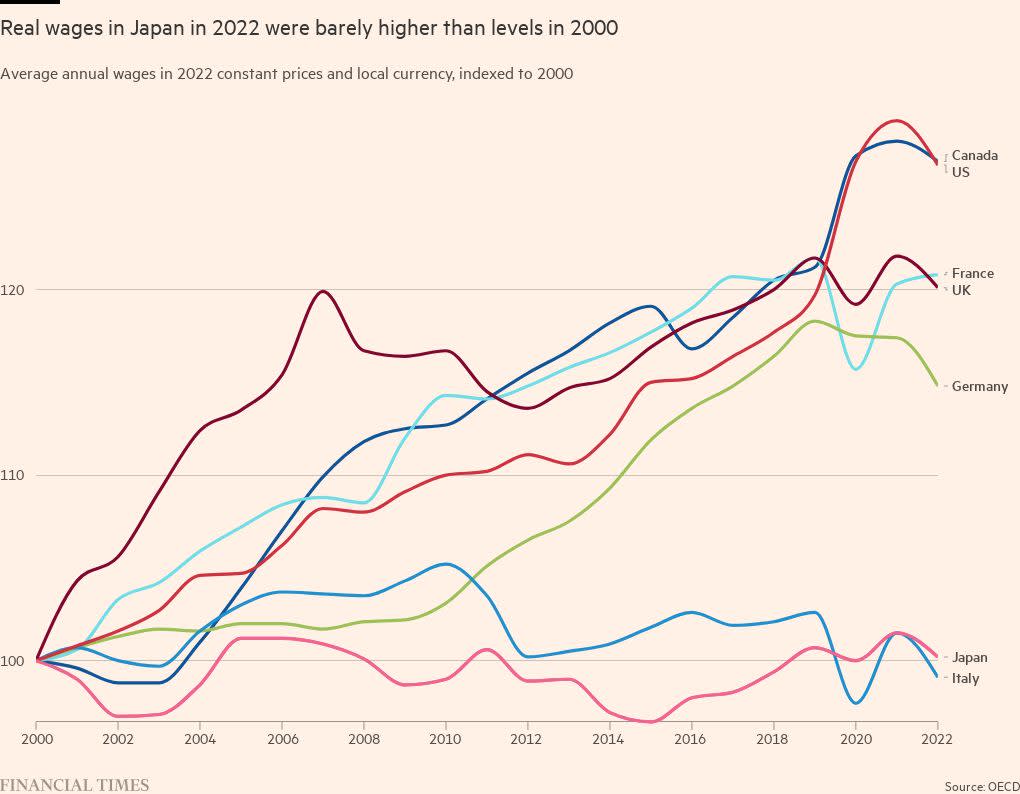Unlock the Editor’s Digest for free
Roula Khalaf, Editor of the FT, selects her favourite stories in this weekly newsletter.
Japanese companies including Honda, Nippon Steel and ANA Holdings have granted workers their biggest pay rise in more than three decades, underlining the inflationary trend and bolstering the case for the Bank of Japan to begin raising interest rates.
Galvanised by the sharp rise in living costs and a deepening labour shortage, the country’s trade unions have negotiated an increase in wages that is certain to exceed the rate of inflation, marking a milestone in a country where real wages have stagnated since the late 1990s.
With the shunto spring wage negotiations mostly concluding on Wednesday, economists expect large companies to give their unionised workers an average wage increase of more than 4 per cent, compared with 3.6 per cent last year. That would be the biggest rise since 1992.
Toyota on Wednesday said it had fully accepted its labour union’s request for a monthly pay increase of up to ¥28,440 ($193), the largest amount since comparable figures were first made available in 1999.
“We wanted to firmly cover for the impact from rising prices,” said Takanori Azuma, Toyota’s chief human resources officer, adding that the increases in monthly salary and bonus payments were at a record level.
Nippon Steel agreed to an 11.8 per cent increase in base salary, exceeding its trade union’s request for the biggest jump in monthly pay since 1979. On Monday, ANA gave its workers an average wage increase of 5.6 per cent, the highest for the airline since 1991. Honda last month agreed to a 5.6 per cent annual pay bump, the highest since 1989.
NEC granted a 4.3 per cent rise in base pay, the highest ever since the current wage negotiation system began in 1998, while Mitsubishi Heavy Industries agreed to an 8.3 per cent annual pay hike, its highest since 2005.
The pay negotiations have been closely followed by investors this year as robust wage growth is crucial for the Bank of Japan to gain enough confidence to begin unwinding its ultra-loose monetary policy measures. Despite recent weak economic data, analysts said the strong shunto results should allow the central bank to end its negative interest rate policy as soon as next week or April.
Combined with strong government pressure, the sharp rise in prices caused by the war in Ukraine and the global energy crisis had already led to large gains in wages during last year’s negotiations. But trade unions had failed to secure pay rises that would cover accelerating inflation while the gains did not spread evenly to small and medium-sized enterprises, which employ about 70 per cent of Japan’s workforce.
“It was extremely hard to demand higher wages when prices were not going up,” said Akihiko Matsuura, president of UA Zensen, one of the country’s largest trade unions with more than 1.8mn members in retail, food, chemicals and other sectors. “We need to bring 30 years of wage stagnation to an end.”
The union, which represents mostly workers at small and medium-sized businesses, has called for a 6 per cent total wage increase, including 4 per cent in base salary. Ahead of Wednesday, retailer Aeon agreed with the union to raise the hourly wage for roughly 400,000 of its part-time employees by an average of 7 per cent this spring in a sign that wage increases were trickling down to society at large.
“The big test is next year as to whether companies will fully respond to the demands of unions even when prices will not rise very much,” said Matsuura. Headline inflation averaged 3.2 per cent last year but has slowed to 2.2 per cent in January on the back of a decline in the imported cost of energy.
But even as inflation pressure declines, companies are still likely to face demands to raise wages as they struggle to find younger workers, further empowering the unions. Japanese workers rarely take to the streets to demand higher wages or better working conditions, but several strikes have occurred this year as companies have failed to meet the demands of unions.
“Looking back, we feel that labour unions have been too reasonable,” said Katsuhiro Yasukochi, chair of the Japanese Association of Metal, Machinery and Manufacturing Workers, which consists of about 390,000 workers mostly employed by smaller businesses.
Yasukochi said he expected its members to be granted a wage increase of well over 4 per cent, which would be the highest since the union was formed in 1999. The outcome of wage talks for smaller businesses are expected in the coming months.
“The labour shortage will never be resolved,” he said. “We have entered an era where company managers who cannot raise wages will be removed from the market.”
Read More: World News | Entertainment News | Celeb News
FT










